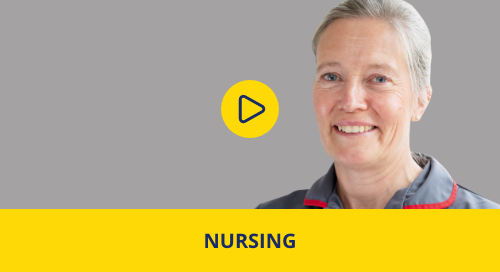person-centred-healthcare-practice-stories-for-growth-development-and-improvement
August 02, 2021
The following blog was authored by Brendan McCormack, Tanya McCance, Cathy Bulley, Donna Brown, Ailsa McMillan, and Suzanne Martin, editors of Fundamentals of Person-Centred Healthcare Practice, published by Wiley-Blackwell in March 2021.
Person-Centredness: To Be or Not to Be
Stories for Growth, Development, and Improvement
In June 2021, the six editors/authors of the book ‘Fundamentals of Person-centred Healthcare Practice’ (McCormack et al, 2021) led a ‘webinar round-table’ conversation about person-centredness through stories. We chose to present our own personal stories of experiencing degrees of person-centred practice in our engagement with health and social care services. We connected our stories with the Person-centred Practice Framework (McCance and McCormack, 2021) and facilitated a discussion that connected the stories told with relevant content from individual book chapters. ‘Provocations’ to participants based on key issues raised in the last chapter of the book were posed as discussion issues. Over 100 people participated in the webinar and engaged in the discussion. Many of these participants also posed written questions, comments, and critiques. We have chosen to make a collective response to these questions, comments, and critiques as a means of keeping the conversation open. We truly believe that it is through respectful, critical conversation that we can raise our collective consciousness about the relevance of person-centredness to health and social care policy and practices.
Connecting the academic content of a book with lived experience can sometimes be a challenging thing to do, as the detail of the story can dominate, and its intention can be lost. As authors and passionate proponents of person-centredness we knew this was a risk, but we were driven by the perspective of Brandon Sanderson, who states, “The purpose of a storyteller is not to tell you how to think, but to give you questions to think upon. Too often, we forget that” (Sanderson 2010). As authors and editors of Fundamentals of Person-centred Healthcare Practice, it would have been ‘easy’ to host a webinar that walked participants through the key issues, principles, and practices that are addressed in the book. In doing this, there can be a tendency for an academic text such as this to be seen as a ‘script’ that sets out the important components of thought and what is taught! Through choosing to tell our own stories we sought to create an embodied text: one that lived through our own experiences, and which were narrated through theory. Whilst some participants gave feedback that perhaps each of us telling our story was ‘excessive’, we believe that embodying the text through personal stories brought us closer to the participants and their lived experience and created living theory, as highlighted by one participant’s feedback:
“Thank you, that was a very interesting discussion and the panel offered a wonderful insight into person centred practice. The ordinary and extraordinary impacts we can make to a person’s life by making simple, positive choices. The art of meeting a person where they are, listening and valuing every life without judgement. It should be on every syllabus from primary to higher education.”
But stories are not always received positively, and we are also aware that personal stories can be seen as just that, personal! This is a provocation to our established ways of thinking about what we give meaning to in our established discourses. Some participants commented on the vulnerabilities displayed by us as a writing team, and whilst we were conscious of that vulnerability in our planning, we are also highly aware of the need for us as persons to show our vulnerabilities for meaningful engagement to happen. A participant commented:
“I have had amazing feedback from a mother I have been working with, which is fantastic, making me emotional every time I read her comments. How do you protect yourself from giving too much?”
Our emotional connectedness to others places us in a vulnerable state, but it is in this state that we learn to connect emotionally and give of ourselves. Of course, working in a culture that can hold us through such vulnerable states is essential to our coherency as persons, including the existence of working processes and methods that enable emotional presencing. In Interaction Ritual Chains, Randall Collins describes a theory of ‘interaction ritual chains’, where interaction situations are seen as rituals (Collins 2004). Even a very short gesture can have something ritualistic in it, but the ritual aspect will fall away if interactions are emotionally empty or if people don’t direct their attention towards the same focus. As human beings, we go from one situation to another and seek emotional energy. In doing this, the ‘chains’ of interaction situations are created, and caring encounters generated. Whilst Collins’s theory is a complex sociological analysis of human relationships and connections, the key issue of emotional connections becoming rituals in our practice is fundamental to person-centred practice. In our stories we recounted ‘ordinary’ practices that are no doubt part of everyday rituals performed by the practitioners who featured in each story. Whilst we can identify a long list of reasons as to why some of these encounters were not person-centred, we also need to recognise that emotional connection is a choice we make, and when we choose to engage emotionally then these chains become part of our normalised practices, i.e., new and sustained rituals.
So person-centred practices are fundamentally associated with creating caring encounters between persons. Whilst care and caring are contested concepts in nursing and healthcare theory, it is also generally assumed that caring encounters, although variously defined, are at the core of effective person-centred practice. Being present is essential to effective emotionally connected caring practices. Ensuring we pay attention to the development of knowledge, skills, and expertise in being emotionally present is as important as any other skill, but as one participant stated:
“Could the nursing curriculum be excessively centred in intellectual/cognitive skills development and be missing the personal, ethical skills development?"
As educators we are aware of the need to achieve balance in our nursing and healthcare curricula. Too much focus on cognitive and technical skills erodes the potential of those skills being operationalised within the context of a caring encounter, whilst over-emphasising the care and compassion focus erodes the need for intelligent, confident and competent practitioners. Of course, it is not a competition for curriculum privilege but instead requires all of us to ensure that a balance is achieved. This is not easy, as some participants in the webinar commented:
“It is so difficult when our students are exposed to negative role modelling in practice and often emulate that practice in order to fit in the with team and pass the placement.”
We know that the social context of learning has a significant impact on all of us and role-modelling is key to how we translate theory into practice, no matter how strong the evidence! It would also be easy to ‘blame’ already stretched practitioners who are often working in systems that are far from person-centred themselves. Neither of these positions are helpful in creating a common discourse to inform a curriculum that is both grounded in reality but also challenges existing realities of practice. In the Person-centred Practice Framework (McCance & McCormack 2021), we argue that the macro-context of practice plays a significant role in shaping practitioners’ everyday experiences and ultimately whether patient/family and staff outcomes are experienced as person-centred or not. From the collective comments and feedback of participants on the webinar, there is still much to do in addressing these issues, and we have set out what some of these key issues are in Chapter 34 of Fundamentals of Person-centred Healthcare Practice.
But, of course, since the book was published, we have experienced the coronavirus pandemic. Much of what we have taken for granted in health and social care has been challenged and, in some cases, changed forever. We are very aware of the challenges that many of these experiences have created and especially their impact on engaging in person-centred practices at all levels of the health and social care system. However, we can also view the pandemic and the post-pandemic period as an opportunity to recalibrate our ways of being and doing, as articulated by Otto Scharmer:
“The coronavirus situation provides an opportunity for all of us to pause, reset, and step up. COVID-19, like any disruption, essentially confronts each of us with a choice: (1) to freeze, turn away from others, only care for ourselves, or (2) to turn toward others to support and comfort those who need help. That choice between acting from ego or acting from ecosystem awareness is one that we face every day, every hour, every moment. The more the world sinks into chaos, desperation, and confusion, the greater our responsibility to radiate presence, compassion, and grounded action confidence” (Scharmer 2020).
We believe that Scharmer’s reflection is a provocation that all of us need to attend to. The Covid pandemic has offered us an opportunity to think and work differently, in ways we never thought possible. Perhaps this is a good time to move beyond the rhetoric of person-centredness and challenge the cultural and socio-political contexts that inhibit consistent person-centred ways of being, doing and becoming. Engaging with person-centred practice is not the preserve of a few passionate people, rather it requires an individual and collective effort, i.e. the engagement with and continuous development of the whole ecosystem of health and social care. Our collective work is far from complete, and perhaps this participant’s comment poses the next challenge in creating such an ecosystem:
“It raises for me the need for leaders to create spaces, moments, and conditions to have those discussions that illuminate what practice looks and feels like.”
REFERENCES:
Collins, R. 2004. Interaction Ritual Chains. Princeton University Press, Princeton and Oxford.
McCance, Tanya, and Brendan McCormack. 2021. “The Person-Centred Practice Framework.” In Fundamentals of Person-Centred Healthcare Practice, edited by Brendan McCormack et al. Wiley-Blackwell.
Sanderson, Brandon. 2011. The Way of Kings. Tor.
Scharmer, Otto. “Eight Emerging Lessons: From Coronavirus to Climate Action.” Medium. March 16, 2020. medium.com/presencing-institute-blog/eight-emerging-lessons-from-coronavirus-to-climate-action-683c39c10e8b.












